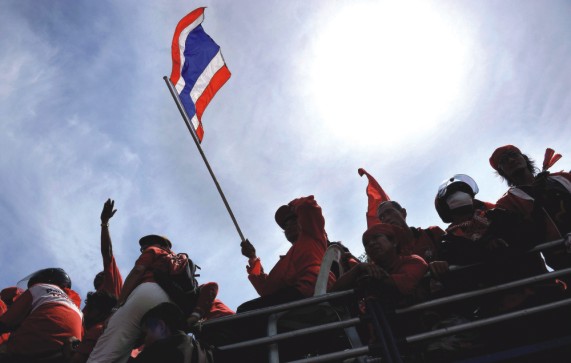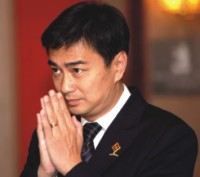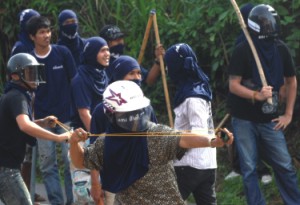International
Media's Role is More Important than Ever

As tens of thousands of red-clad protesters rallied in Bangkok last week in their bid not only to topple Prime Minister Abhisit Vejjajiva's government but also to abolish what they called "bureaucratic polity", the Thai media was caught in the crossfire. Over the past weeks, news consumers have heard several terms that the protest leaders use to claim they are fighting for a certain ideology. The media's challenge, or main task perhaps, is to report the claims, mudslinging and developments without aggravating the situation while making sure that professional requirements are also fulfilled.
 |
Prime Minister Abhisit Vejjajiva |
Fugitive former prime minister Thaksin Shinawatra, through his video links, called on people who wanted "real democracy" to gather in great numbers at a recent rally. The red-shirt leaders tried to compare the rally to the students' democratic uprising on October 14, 1973, and even the French revolution, even though they could not spell out exactly what they wanted to achieve.
Last year, the then anti-government yellow-shirt protesters confused the public with the term "new politics".
Suddenly these phrases have become buzzwords in the press. They emerge in the headlines every day, even though reporters might not fully understand what these expressions are all about.
The current political crisis has come this far, thanks largely to the use of information technology. The yellow-shirted leaders of the People's Alliance for Democracy managed to spread their views via cable TV, while the red-shirted demonstrators are doing the same.
Thaksin knows well the nature of the press, that the newspapers and electronic media will certainly report what he says in their headlines the next day, and that's the reason he uses video links to spread allegations against his political opponents.
Several of his claims have been dismissed as groundless, but still they find their way into the mainstream media. Readers and TV viewers have been confused by these allegations. The media has so far played the role of messenger for both sides. The intention is admirable for the media is simply trying to balance their views. However, the media - albeit unknowingly - has inflamed the political tension by falling into the traps of this political game.
 |
The media - albeit unknowingly - has inflamed the political tension by falling into the traps of this political game. |
For instance, much has been said about "amatayathippatai" or what political scientists have tried to translate into English as "bureaucratic polity", even though most people don't know what they are talking about. The red-shirt protesters claim they want to abolish this amatayathippatai system, and the press reports the news as such. This is despite the fact that, judging from the speeches of several red-shirt leaders, the conflict boils down to a personal issue. They simply want to target Privy Council President Prem Tinsulanonda, on the say-so of Thaksin.
Thaksin urged his supporters to "rise up" for "democracy" because "Thailand needs change". But the buses carrying the upcountry protesters to Bangkok were full of people chanting, "Thaksin come back. Abhisit get out."
This shows that in spite of the sophisticated terminology the protester leaders love to use, the conflict does boil down to just one man. The idea of an ideology is simply used to back up the claims of both political sides and to stir up the crowds.
Over the past few weeks, the local press has tried to report what both sides say, as is their duty as members of the media. The leaders of both sides seem to understand very well the nature of the press and they try to manipulate media space to their advantage. Certain incidents have been leaked to the press without verification.
Some journalists and news outlets take a neutral political stance while others clearly reveal their political affiliations. This is normal in a democratic society and Thailand should cherish the fact that the Thai press has been able to exercise its freedom to report so far.
However, the ongoing political crisis is very sensitive, and if the press is not careful about how some things are reported, the result could be an explosion of violence. Some reports might result in misunderstanding and cause more division in society. Therefore, journalists must ensure that they don't report news in such a way as to inflame the crisis.
The media should try to verify all comments, especially those that seem irresponsible. The media should report the news within the context and provide useful explanation about what is really going on in Thailand.
Although Thailand may be able to pass through this crucial week peacefully, Thais might not gain a better understanding of what democracy is all about. After all, what is happening in Thailand right now shows that Thais are anxious to fulfil their role in our democratic system.
--Editorial Desk
The Nation (Thailand)
Copyright
(R) thedailystar.net 2009 |
